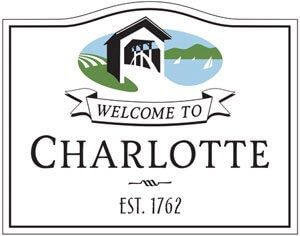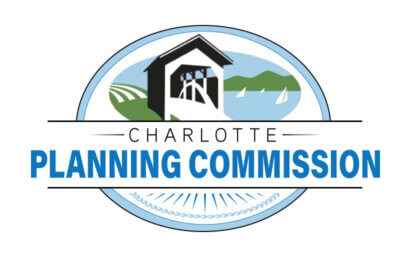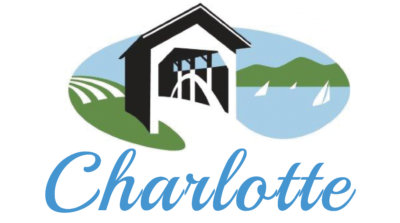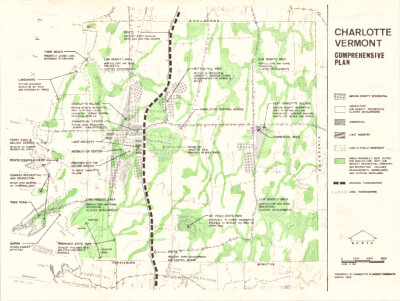Planning Commission holds Land Use Regulation hearing and hears Mt. Philo Road subdivision plans
 Public comment was the theme at the July 16 Planning Commission (PC) meeting, where Charlotte residents had plenty to say about proposed changes for Land Use Regulations (LUR) and about a sketch plan proposal for a four-lot subdivision on Mt. Philo Road.
Public comment was the theme at the July 16 Planning Commission (PC) meeting, where Charlotte residents had plenty to say about proposed changes for Land Use Regulations (LUR) and about a sketch plan proposal for a four-lot subdivision on Mt. Philo Road.
After a delay because of the novel coronavirus, the Land Use Regulation change hearing was at the top of the agenda. Debra Kassabian, who owns Gemini Properties along with her husband Mike Dunbar, joined the meeting via Zoom to present their reasons for the proposed change. They own and manage the Charlotte Crossing property, which is the site of the former Vermont Wildflower Farm on Route 7 south of Ferry Road. They created and then submitted in February of this year a petition to have a public hearing to repeal a portion of the Charlotte LURs that would reduce the standard for parking, loading, and service areas for site plan review under section 5-5. The rule prohibits these areas from being located in the front of a building. In February of this year, the PC issued a report saying that they do not support the repeal.
Kassabian said they suggested that the PC “remove the wording in its entirety” from the LURs. “The reason behind this is that we believe that the current regulation really limits the opportunities for utilizing land for property development and site design considerations…and inhibits ability to achieve maximum accessibility; this is not particularly for handicap access but accessibility in general,” she said.
The current LURs state that the town is trying to protect against “strip-mall style development,” and Kassabian said they feel that if the parking-related language is removed completely, the town can still prevent that style of development through other sections of the regulations.
Dr. Andrea Regan is a physician and owner of the Charlotte Family Health Center, which has been trying to move their practice from an older house on Ferry Road into a new building in the center of the West Village. She commented during the meeting that the parking restriction regulation “has become a barrier for our project” and noted that Philo Ridge Farm, a new business in the last two years, has parking in the front, as does the Charlotte Children’s Center.
Nicole Ravlin owns Junapr Communications, which is located in the Charlotte Crossing building. She said that though her business doesn’t rely on foot traffic, others in the building do, like the Ellie Parr retail jewelry store and whatever eatery eventually fills the restaurant space that was constructed in the building. She said parking in the back gives the impression that the building is “a ghost town, and I think it does detract” passers-by from stopping.
Charlotter Robin Pierce joined in to comment that with land use regulations and a town and development situation, “there’s a little bit of give and take; code shouldn’t paint a municipality into a corner. With the best intentions the regulations can stifle something you want to have happen.”
Bill Stuono, the newest member of the PC, noted that South Burlington and Shelburne “no longer permit parking out front.” He also said that he thinks there’s flexibility in the current regulations and that the PC does currently have the ability to waive this requirement
At this point in the meeting, Kassabian and PC chair Peter Joslin disagreed about the reason that Gemini Properties was required to resubmit a site plan for the property earlier in the year; she said it was because the town’s rules regarding handicap parking spots inhibited their ability to create spots that were compliant with the Americans with Disabilities Act. Joslin said that the parking issue was only one of several reasons they needed a new site plan, including an increase in the number of parking spaces, an increase in the square footage of the restaurant space, landscaping changes, and relocated parking spots.
PC member Marty Ilick said that the current regulations allow for wiggle room and there’s no reason to change the LURs completely. “I think the language in our regulations is very clear,” she said. “There is flexibility to negotiage what is the best way to keep the aesthetics—which is a very common Vermont principle. I feel like we’ve got the right language here; it’s the matter of our ability to be flexible with the applicant to solve the problem. I just don’t see the justification for deleting language from the Land Use Regulations—flexibility is already suggested.”
Ravlin joined the discussion again to point out challenges stemming from deliveries and brought up the Philo Ridge Farm parking lot as well—to which PC member Charlie Pughe responded that since Philo Ridge Farm is an agricultural property, the town has no approval rights for their site. He also said that it’s important to remember the history of changes regarding the Charlotte Crossing project since “the plan and design evolved over time.”
Regarding the earlier-referenced parking spot that had to be moved, Kassabian said to the commission, “I’m a rookie, and none of you caught this and you’ve been through it many times. This was not caught.”
Pughe responded that it’s not the Planning Commission’s responsibility to point out flaws, and that the hired design professionals for a project are responsible.
Kassabian replied, “You’re approving the site plan, aren’t you?”
The public hearing ended shortly afterward and the Planning Commission will take comments into consideration regarding the petition.
After some paperwork and approving minutes from previous meetings, the PC tackled the sketch plan for a proposed four-lot subdivision at 4035 Mt. Philo Road, a property owned by Mitchell and Wendy Shifrin. Jason Barnard from Barnard & Gervais, which is managing the project, represented the couple during the hearing. After discussion with the Planning Commission regarding sight distances for proposed driveways, wastewater plan discussions, and other run-of-the-mill sketch plan topics, Ilick said she thought the plan was “generally a super concept, and you’ve done a nice job.”
The neighbors who joined the meeting, were less sure that it was a nice concept. Jill Wolcott and Alicia Eure expressed concerns about the subdivision creating problems with wildlife in the area. Barnard said during his presentation that he had consulted wildlife maps and studies done by the Vermont Agency of Natural Resources, and had taken care to locate the required open space for such a project in a place where any wildlife coming from nearby Pease Mountain could access a wetland on the other end of the property.
Eure said that it is “heartbreaking to see [the land] cut up like that…it’s a sad thing to see that beautiful property just divided up.” She said that she has seen deer, moose, bobcats and wolves (wolves are not thought to live in Vermont, though a coyote-wolf hybrid exists in the area) and other animals crossing through the property and that she does not support developing the land.
Wolcott said, “Maybe all this wildlife is more than we thought,” and suggested that further study be done. Barnard said that he consulted the required agencies to ensure that the wildlife is protected, and that in fact, “it was a big goal of the project, and in my opinion, it’s been met.”
Eure took issue with the fact that the Shiflins live elsewhere in Charlotte, and said to them, “You’re developers.” The Shiflins said that though they are not professional developers, they saw the land as an opportunity for a project and to help out the previous owner, who had been trying to sell the property for some time.
Joslin finished the discussion by saying, “Who lives there isn’t important. We need to move on.”
The next steps in project are two more public hearings and further development of the building site plans.
Related Stories
Popular Stories
If you enjoy The Charlotte News, please consider making a donation. Your gift will help us produce more stories like this. The majority of our budget comes from charitable contributions. Your gift helps sustain The Charlotte News, keeping it a free service for everyone in town. Thank you.
Andrew Zehner, Board Chair







